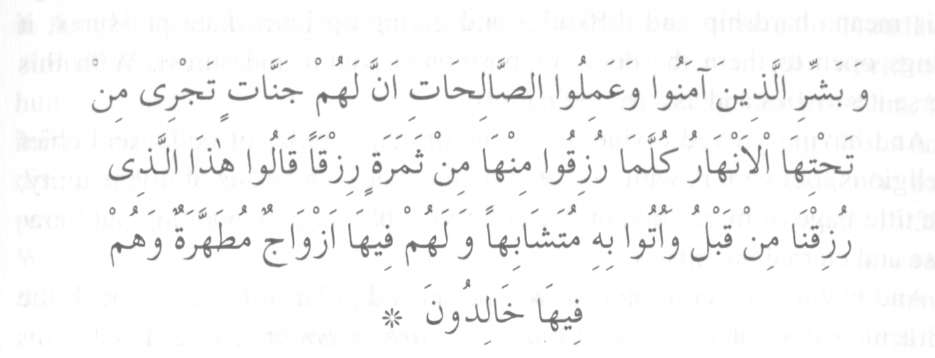Verse 25

But give glad tidings to those who believe and work righteousness, that theirs are gardens beneath which rivers flow. Every time they are fed with fruits therefrom, they say: "Why, this is what we were fed with before," for they are given things in similitude; and they have therein companions pure [and holy]; and they abide therein [for ever]. (Wa bashshir alladhîna âmanû wa 'amilû al-sâlihât anna la-hum jannâtin tajri min tahtihâ al-anhâr kullamâ ruziqû minhâ min thamarâtin rizqan qâlû hâdhâ alladhî ruziqnâ min qablu wa utû bi-hi muta-shâbihan wa la-hum fî-hâ azwâjun mutahharatun wa hum fi-hâ khâlidûn.)
Consider this: the word-order and positioning (nazm) of this verse, like its sisters, has three aspects: the positioning of the verse as a whole [and its relationship] with what precedes it; the positioning [and relationships] of the verse's phrases; and positioning [and relationships] of the constituents of the phrases.
The First
Between this verse's meaning and the previous verses are various relations, and different lines stretch out from it to those verses' phrases. Surely you see how at the start of the sura the Qur'an praises itself and the believers, for [their] belief and good works, then with this verse indicates the result of belief and fruit of good works. And similarly, how it censures the disbelievers and condemns the dissemblers and describes their way which leads to eternal perdition, then alludes with this verse to the light of everlasting happiness, pointing it out to them to increase their sense of loss at having missed that supreme bounty.

 Türkçe
Türkçe
 العربية
العربية
 Pyccĸий
Pyccĸий
 français
français
 Deutsch
Deutsch
 Español
Español
 italiano
italiano
 中文
中文
 日本語
日本語
 Қазақ
Қазақ
 Кыргыз
Кыргыз
 o'zbek
o'zbek
 azərbaycan
azərbaycan
 Türkmence
Türkmence
 فارسى
فارسى